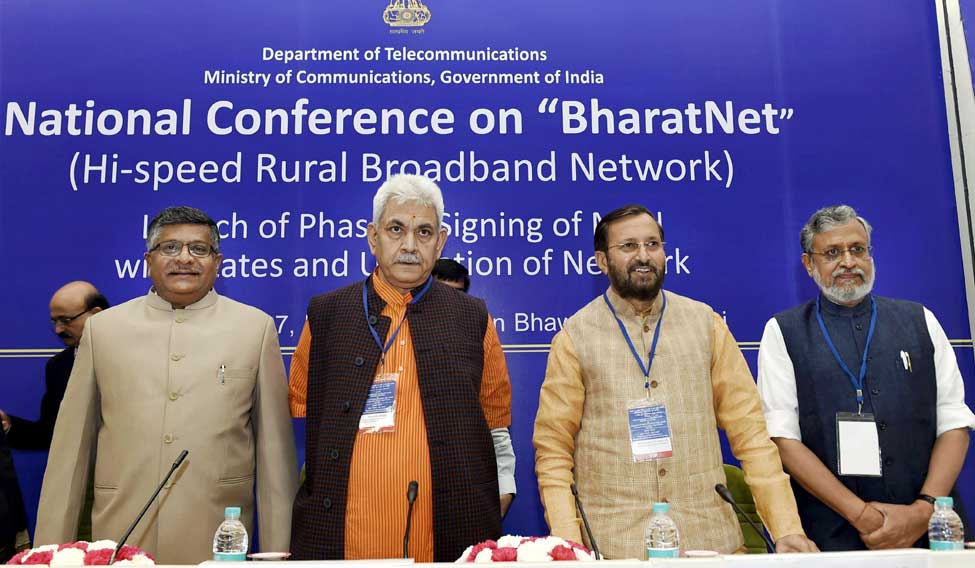The BharatNet project, which aims to provide high-speed broadband connections to 2.5 lakh gram panchayats across the country by end of March 2019, launched its second phase with an outlay of Rs 34,000 crore. Under Phase I, about 1 lakh gram panchayats were connected and are likely to become operational by December, 2017.
On Monday, the Union telecom minister Manoj Sinha held a national conference along with IT secretaries from states and representatives of telecom service providers like Airtel, Reliance Jio, Vodafone, Idea, Spectranet and Hathway among others.
Secretaries of more than 20 states attended the conference. Among the main topics of discussion were how e-governance services could be offered on this network.
"The main challenge in states like ours is to digitise government records like land, birth and death certificates and it would be the starting point for offering most e-governance services in states," said Ashok K Meena, IT secretary from Odisha.
He said most states are facing similar challenges but the BharatNet platform can be a great utility tool for first-time e-governance service seekers.
The Department of Telecom (DoT) offered a demonstration of the kind of services that could be availed on the BharatNet portal once the network is operational and ready to transmit data.
"With BharatNet and Digital India programme, we hope to touch lives, connect people, inform, educate, spread awareness, create jobs, save lives, build relationships, nurture bonds, make significant investments, contribute to the exchequer and the economy and above all bridge the urban-rural digital divide and amplify financial inclusion," said Sinha, addressing the conference.
Sinha also said that, BharatNet, which was earlier known as National Optical Fibre Network (NOFN), is a dream of Prime Minister Narendra Modi and it is progressing well.
"When it was launched previously it was actually, no fun for anyone. Little or no progress had been made. Progress had been rather slow and the actual work on the project commenced only in the second half of 2014," said Sinha.
In the Phase II of the programme an additional 1.5 lakh villages are likely to receive optical fibre network.
"The Phase I work is likely to be completed by December 18. We have taken the network to more than 90,000 villages so far. Work in another 80,000 villages are nearing completion," said N Sivasailam, additional secretary, DoT, who is heading the BharatNet rollout.
Sivasailam said that the network would carry a data speed of up to 1 Gbps, and while the government is providing the network, content on it has to be developed by telecom operators.
"One central portal with some limited e-governance services will be hosted by the Department of Telecom. However, there is scope for further monetising the network and that is where we expect private players to chip in with their content," said Sivasailam, who was also an adviser for the Kochi Metro.
"The provision of broadband, internet penetration and e-services has a positive impact on GDP growth besides quicker, transparent and cost-effective governance," said Sinha.
The DoT had sped up on the progress and around 25,000 gram panchayats have been made service ready for the one and half month duration.
Once complete, BharatNet is expected to be the world's largest rural optical fibre network. In the Phase II of the project, it is 100 percent Made in India as from fibre to design and software has all been spearheaded by C-DoT.
"By 2020 about 25 lakh government institutions and 50 lakh households will be linked to BharatNet," said Aruna Sundararajan, secretary, department of telecom.
She said, memorandum of understanding for the Phase II rollout has already been signed with 20 plus states and with the remaining too the government is in touch seeking their participation in the programme.
"Keeping in view the Government’s aim to provide affordable digital services in rural areas, the tariffs for utilising BharatNet infrastructure have also been reduced by up to 75 per cent from earlier notified tariffs," said Sundararajan.
"Owing to this, the telecom companies including Airtel, Reliance Jio, Idea and Vodafone have come forward for providing connectivity services utilising BharatNet," she said.
Telecom companies Airtel, Vodafone and Reliance Jio, handed over advance cheques to the government during the conference seeking lease of BharatNet infrastructure. These telecom companies also helped the DoT showcase service delivery models during the day-long conference.






